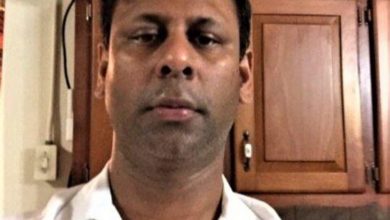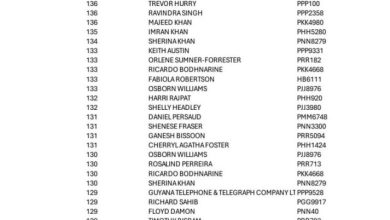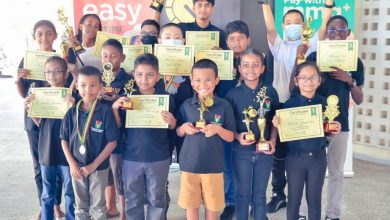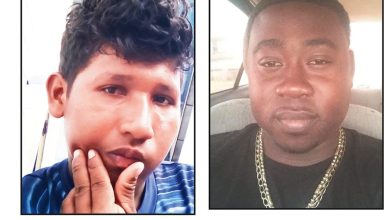Local historian, professor, and artist Tao Leigh Goffe releasing debut book next year
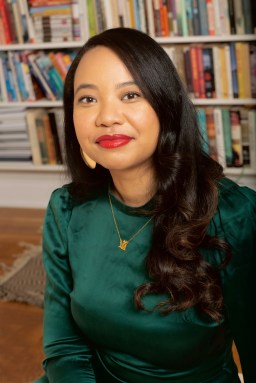
On Jan. 21, 2025, award-winning historian, professor, and artist Tao Leigh Goffe will have her highly anticipated debut book, “DARK LABORATORY: On Columbus, the Caribbean, and the Origins of the Climate Crisis” (published by Doubleday/Penguin Random House) released.
According to Penguin Random House, the book is “a groundbreaking investigation of the Caribbean as both an idyll in the American imagination and a dark laboratory of Western experimentation, revealing secrets to racial and environmental progress that impact how we live today.”
Goffe grew up as a Black girl in London, and her experience was much more attuned to Afro-Caribbean traditions and culture than the general United States context. “It is so common to hear Jamaican language as universal British speech that non-Caribbean people use daily. West Indian food is easily found in big cities across the UK. Caribbean music is the soundtrack in many ways of British life,” she said.
She migrated from London to New York when she was young. Initially, Goffe and her family would move to Miami for the weather.
“We were so excited to trade the grey skies and rain for what we imagined was a tropical paradise, much more like the Caribbean. It was a rude awakening when we arrived during the unrelenting hurricane season and, in addition, learned about the prevalence of gun violence and racial segregation in Florida. So, we quickly pivoted to New York City instead because we have a lot of family here,” she added.
In the third chapter of DARK LABORATORY, Goffe reflects on growing up in London and vividly remembers getting lost at the British Museum. She considers how, when she was younger, she never could have comprehended the holdings of collections derived from Jamaica as someone who was born to a Jamaican mother.
“Not only is the British Museum founded from Jamaican wealth and the plantation labor of racial slavery, but also by Hans Sloane (whose collection the museum is founded upon) 71,000 plant and animal specimens to Britain from Jamaica, St. Kitts, Nevis, Barbados, and other islands. In the sixth chapter of the book, I reflect on moving from the UK to the US and my upbringing in Southeast Queens and the role of environmental racism in Black Caribbean neighborhoods,” she stated.
People may be surprised to know that she spent much of her early life as a fencer, from ages 7 to 20, and even fenced on the Princeton Varsity team for a short period. According to Goffe, the sport instilled in her a sense of martial arts and philosophy that continues to guide her.
The founder of her fencing club, Peter Westbrook, is of Afro-Asian heritage, like her. Born to a Japanese mother and African American father, he brought home the bronze medal for the USA at the 1984 Summer Olympics in Los Angeles, CA, and was the first American to do so.
“Our club was majority-Black, with many fencers of Afro-Caribbean background. It was incredible to be raised in a community with other athletes of color, many of whom are now Olympians. Being a fencer has shaped me in more ways than I can articulate because of a certain orientation to the world and what it means to fight and strategize as a Black woman,” she explained.
The book will be published at the time of the inauguration of the 47th president of the United States. “With talk of repealing the fourteenth amendment, it is not lost on me as a Black woman that all sorts of questions about citizenship are coming into play. As a naturalized citizen, I think often about how the process is so different for white immigrants in America – Elon Musk and Melania Trump being among them,” she continued.
Goffe then explained how the presence of Black people, especially those of Caribbean descent, is always under scrutiny and suspicion. The most recent example of this was when some people questioned Vice President Kamala Harris’ identity as a Black woman during her presidential campaign. Her losing the US election makes this clear, especially for Goffe as a woman of Afro-Asian heritage with a parent from Jamaica. Thus, she needs to have a platform in publishing this book to elaborate and articulate how rich of an inheritance the Black experience is.
“I hope to introduce the reader to what I see as the galaxy of Black traditions, which could hold promise for solving the climate crisis because we are attuned to the art of survival, having witnessed so many timelines of apocalypse and world-ending events before now,” she added.
Goffe sees the acclaimed author, Toni Morrison, her professor as an undergraduate at Princeton, as the most significant influence on the path she’s chosen today. “Attending a university like Princeton was so alienating –with a student body totaling 7% Black students. Professor Morrison’s class gave me a lot of strength and analytical tools to assess the history of Princeton,” Goffe said.
In Morrison’s class, as a student, Goffe wrote her midterm paper on the Americas as a haunted house – as occupied territories. Goffe’s debut book, DARK LABORATORY, draws on Morrison’s 1992 work of literary criticism, Playing in the Dark: Whiteness and the Literary Imagination.
“Professor Morrison famously said, ‘If there’s a book you want to read, but it hasn’t been written yet, then you must write it.’ I founded my climate research organization, the Dark Laboratory, with the same ethos of interrogating the crossroads of stolen land and stolen life across the hemisphere from Louisiana to Trinidad and Brazil. I believe if there is an intellectual community you need and it does not yet exist, it’s up to you to create it,” she continued.
Surprisingly, Goffe did not have an interest in becoming an author until she became a professor. Since then, she’s published over 15 peer-reviewed articles. She first began teaching at the university level in 2011.
“When 17-year-old Trayvon Martin was murdered on Feb. 12, 2012, the classroom shifted in despair. White conservative students at Yale began to ask different questions of me as an educator about the structural nature of white supremacy in the United States. My best teachers have been my students, and I have had the honor to teach over one thousand of them. Black Studies and feminist pedagogy orient me in the tradition of call-and-response as opposed to a top-down pedagogy of simply lecturing or teaching from a textbook,” Goffe explained.
Her work as a DJ has also influenced her in the classroom, leading her to make connections through Afro-Caribbean modes of remixing and Black sonic technologies in the post-World War II history of engineering sound systems.
Goffe shared what publishing her debut book means: “To be able to publish a trade book in addition to this academic work is urgent because the message of the climate crisis and racial justice is too urgent to remain behind paywalls. While I am first an educator – as a Black Studies professor, my aim has always been to reach beyond the Ivory Tower to speak to an audience that cannot afford to pay exorbitant tuition fees.”
Goffe hopes her writing “inspires a model for collective action and creating the intellectual communities of nourishment the future needs.” In addition, the book is a chorus of all the wonderful people she has met while traveling through the Caribbean, from Jamaica to Montserrat, to Aruba, and even to Suriname, and it gives voice to the everyday actions that people are taking against the climate crisis.
“Seeing the volcano in Montserrat, I learned about imperial abandonment and neglect when it comes to Black-majority places. As Hurricane Beryl loomed near this past summer in George Town, I understood the urgency of how much more frequent natural disasters are becoming and that they always tragically strike the Caribbean first. Climate reparations are overdue by Western nations and transnational corporations that are the biggest polluters,” she explained further.
By beginning with Christopher Columbus and his mistake of so-called “discovery,” Goffe hopes readers around the world will reorient their understanding of the origins of the climate crisis.
“Sailing for Spain, Columbus stole the land and led to the theft of people to change and cultivate the climate of the Americas. By beginning with the Caribbean, where Columbus landed in 1492, and the present-day Bahamas, a greater understanding of colonialism as a regime of extracting from the earth becomes clear,” she explained.
In the book, Goffe encourages others to use the Caribbean as a method, which is to say, to think through islands for solutions to our shared global crisis. She also takes inspiration from Caribbean leaders like Mia Mottley, Rihanna, and her Clara Lionel Foundation, who are also leading the way in climate advocacy.
Goffe is a new mother to a son born in the Chinese zodiac year of the dragon, and she said he gives her hope for what future generations will inherit of the earth and the seas. Goffe wants the book, also debuting in the year of the Chinese dragon, to be part of her legacy, as the first of many others she hopes to write.
“The book is a blueprint for how we fight. It is a reminder that colonialism is not over, and so therefore neither is the fight of Black and Native people against it,” Goffe said, adding, “I want my legacy to be one of seeding the conditions of creative possibility for those doing the vital work every day to fight against polluters, to save the coral reefs, to archive Afro-Indigenous traditions, to protect endangered species.”
She wants this book to inspire others, reminding them, “It is our duty to protect the earth that has nourished us for generations.” While the topics will vary in future books, she writes that the underlying message will be to encourage everyone to keep fighting against what colonialism has done to destroy the world.
Additionally, she wants her readers to take ownership and accountability for the environment by looking at their ancestry. She hopes they will be inspired to act and not be passive when it comes to the climate crisis because all hope is not lost.
“I hope more people of color will understand that the appreciation of nature – in activities such as birdwatching is not white –and that we have centuries-long traditions of Black, Asian, and Native birdwatching. By becoming invested in a personal sense of geography and honoring non-Western scientific traditions, cosmologies, and religions, there is hope for a future where petrochemical companies do not determine our polluted fate,” she added.
To stay updated with Goffe, those interested can find more information about her work and follow her on social media platforms. This information can be found here: https://www.taoleighgoffe.com/
Those who are interested in pre-ordering the book can do so here:
https://www.penguinrandomhouse.com/books/725301/dark-laboratory-by-tao-leigh-goffe/

